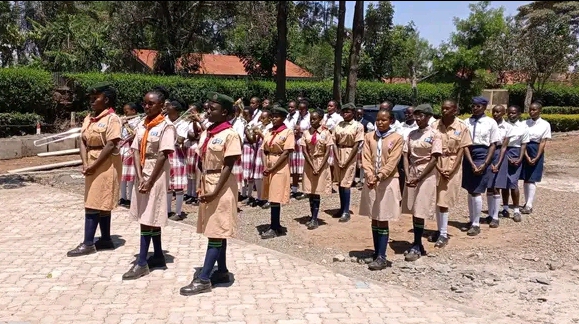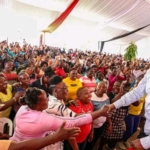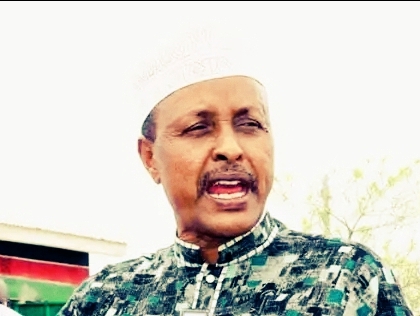In a transformative gesture aimed at uplifting girls’ education in Kenya’s rural heartlands, the Merck Foundation has donated a staggering Sh105 million to Maasai Girls High School in Narok County.
This substantial contribution is set to revolutionize the institution’s infrastructure and provide life-changing opportunities for vulnerable students, fostering a brighter future for young women in a community where access to quality education remains a critical challenge.
The donation, announced amid an on-site inspection of ongoing projects, underscores the foundation’s commitment to gender equality and educational empowerment.
Already, the funds have been strategically deployed to construct a state-of-the-art dormitory capable of housing up to 1,000 students, alongside a spacious dining hall designed to enhance daily life at the school.
Additionally, the initiative includes full sponsorship for 20 girls from needy and vulnerable backgrounds, ensuring that financial barriers do not hinder their academic pursuits.
Prof. Frank Stangenberg-Haverkamp, the esteemed chairperson of the Merck Foundation and a renowned German philanthropist, led the event, emphasizing the profound impact of creating supportive learning environments.
“These girls have all it takes to be successful. They are our future county and national leaders, so we have to support them,” he declared passionately.
Highlighting the dormitory’s role as a “second home” for the students, Stangenberg-Haverkamp stressed the need for comfort and security to maximize academic performance.
“The dormitories are the girls’ second home, hence the need to make them comfortable so that they can perform at their best,” he added, drawing from his extensive experience in global philanthropy.
The Merck Foundation, a non-profit arm of the German multinational Merck KGaA, has long been at the forefront of initiatives promoting health, education, and sustainable development across Africa.
This latest donation aligns with their “Educating Linda” program, which focuses on girls’ education in underserved regions, particularly in communities like the Maasai, where cultural norms and economic hardships often limit opportunities for female students.
By investing in infrastructure, the foundation not only addresses immediate needs but also lays the groundwork for long-term societal progress, potentially reducing dropout rates and boosting enrollment in higher education.
The event drew prominent local leaders, including Narok County Women Representative Rebecca Tonkei and members of the school’s Board of Management (BoM), chaired by Charity Kisotu.
Tonkei, a vocal advocate for women’s rights, expressed profound gratitude for the foundation’s generosity, describing it as a “big win” for the entire Narok community.
“Education is a shared responsibility. By investing in these girls, you are investing in the future of society. Your kindness will forever remain in the history of Maasai Girls,” she noted during her address.
Tonkei urged the students to cherish and maintain the new facilities, warning that infrastructure challenges plague schools nationwide due to Kenya’s burgeoning student population.
“This donation is a big win, not only for this school but the entire Narok County,” she reiterated, calling on the girls to reciprocate the support through diligent studies and stellar results in national examinations.
Sharing her personal journey, Tonkei revealed how the Jomo Kenyatta Foundation funded her education, paving the way for her academic achievements and eventual election to the National Assembly.
“I am a proud product of the Jomo Kenyatta Foundation, which catered for my school fees. The Foundation is the reason behind my academic success,” she said, inspiring the audience with her rags-to-riches story.
Echoing these sentiments, BoM Chairperson Charity Kisotu, herself an alumna of Maasai Girls High School, delivered an empowering message rooted in her own experiences.
Rising from humble beginnings, Kisotu has held prestigious roles, including Director at the Central Bank of Kenya, positions at the Public Service Commission of Kenya, and her current tenure as a commissioner at the Judicial Service Commission.
“I have served as a Director at the Central Bank of Kenya, worked for Public Service Commission of Kenya, and now serve as a commissioner at the Judicial Service Commission. This means our girls too have the capacity of becoming great leaders in future,” she affirmed, encouraging the students to harness their potential through hard work.
Kisotu underscored the donation’s role in creating a conducive study environment, which she believes will unlock unprecedented opportunities for the school’s pupils.
Her story serves as a beacon of hope, illustrating how education can transcend socio-economic barriers in Kenya, where girls’ enrollment in secondary schools has steadily increased but still lags in pastoralist communities like Narok.
Chief Principal Cecelia Teeka provided further context on the school’s scale and needs, noting that Maasai Girls High School currently serves 1,600 girls supported by a dedicated staff of 60 teachers. With the new infrastructure, the institution is poised to accommodate even more students, addressing overcrowding and improving overall educational quality.
Teeka expressed optimism that these enhancements will elevate the school’s performance, contributing to national goals under Kenya’s Vision 2030 and the Sustainable Development Goals (SDGs), particularly SDG 4 on quality education and SDG 5 on gender equality.
This donation comes at a pivotal time for girls’ education in Kenya, where initiatives like free secondary education have expanded access, yet persistent issues such as inadequate facilities and poverty continue to impede progress.
Experts highlight that investments in boarding schools like Maasai Girls are crucial in regions prone to early marriages and female genital mutilation, common cultural practices among the Maasai that the government and NGOs are actively combating.
As the projects near completion, the Merck Foundation’s contribution is expected to ripple beyond the school walls, empowering generations of Maasai women to become leaders, innovators, and change-makers.
For Narok County and Kenya at large, this act of philanthropy is a reminder that collaborative efforts between international foundations, local leaders, and communities can bridge educational gaps and foster inclusive growth.
In a nation striving for equitable development, stories like this highlight the transformative power of targeted investments in girls’ education—turning aspirations into realities and building a more prosperous future for all.
Share This Post





